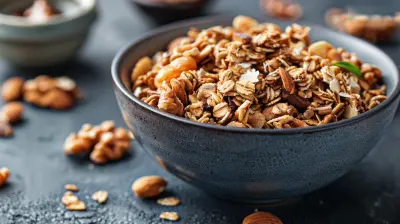11 April 2025
When it comes to heart health, we often hear about exercising, managing stress, and eating less processed foods. But one crucial factor that many people overlook is fiber. Yep, that simple, often-forgotten nutrient can be a game-changer for your ticker!
Fiber doesn’t get the hype that protein or healthy fats do, but trust me, your heart needs it. If you’re aiming for a stronger, healthier heart, fiber should be a non-negotiable part of your diet. So, let’s break it down—how does fiber protect your heart, and how can you get more of it in your daily meals?

What Is Fiber, and Why Does It Matter?
Fiber is a type of carbohydrate, but unlike sugar or starch, it doesn’t get digested. Instead, it passes through your digestive system, doing all sorts of incredible things for your health.There are two main types of fiber:
1. Soluble fiber – This type dissolves in water to form a gel-like substance. It helps lower cholesterol and stabilizes blood sugar levels.
2. Insoluble fiber – This one doesn’t dissolve in water but keeps your digestive system moving smoothly, preventing constipation.
Both types benefit your overall health, but when it comes to your heart, soluble fiber steals the show.

How Fiber Supports Heart Health
1. Lowers Bad Cholesterol (LDL)
Think of fiber as a sponge that soaks up excess cholesterol before it can clog your arteries. Soluble fiber binds to cholesterol in your digestive system, dragging it out of your body before it reaches your bloodstream.Studies show that people who consume more fiber tend to have lower levels of LDL (bad cholesterol), reducing their risk of heart disease.
2. Helps Regulate Blood Pressure
High blood pressure is a silent killer—it puts extra strain on your heart, making it work harder than it should. The good news? A fiber-rich diet can help keep your blood pressure in check.Fiber promotes better circulation, reduces inflammation, and keeps your arteries flexible. This means your heart doesn’t have to fight as hard to pump blood, lowering your chances of hypertension.
3. Reduces the Risk of Heart Disease
A fiber-rich diet has been linked to a reduced risk of heart disease. Studies suggest that people who eat enough fiber have a lower likelihood of heart attacks and strokes.Why? Because fiber helps regulate cholesterol, blood sugar levels, and blood pressure—all of which contribute to a healthy cardiovascular system.
4. Supports Healthy Weight Management
Carrying extra weight, especially around your midsection, increases your risk of heart disease. Fiber can help you manage your weight by keeping you fuller for longer.High-fiber foods take longer to digest, reducing hunger and preventing those mid-day snack cravings. This means you’re less likely to overeat, which can lead to better heart health in the long run.
5. Controls Blood Sugar Levels
Unstable blood sugar levels don’t just affect people with diabetes—they can also increase the risk of heart disease. Luckily, fiber slows down the absorption of sugar, helping to keep blood sugar levels steady.This means fewer spikes, fewer crashes, and less strain on your heart. It’s a win-win for your cardiovascular health!

The Best High-Fiber Foods for Heart Health
Now that we know why fiber is so important, let’s talk about the best food sources.Here are some fiber-packed foods to add to your diet:
Fruits
- Apples- Berries (strawberries, raspberries, blueberries)
- Pears
- Oranges
Vegetables
- Broccoli- Carrots
- Brussels sprouts
- Spinach
Whole Grains
- Oats- Brown rice
- Quinoa
- Barley
Legumes
- Lentils- Chickpeas
- Black beans
- Kidney beans
Nuts & Seeds
- Chia seeds- Flaxseeds
- Almonds
- Walnuts

Simple Ways to Get More Fiber in Your Diet
Getting enough fiber doesn’t have to be complicated. Use these easy tips to boost your intake:1. Start Your Day with Oatmeal
Oats are fiber powerhouses! Top them with berries and chia seeds for an extra boost.2. Snack Smart
Instead of reaching for chips, grab a handful of almonds or an apple. They’ll keep you full without the empty calories.3. Swap White for Whole
Opt for whole grain bread, pasta, and rice instead of the white, processed versions.4. Load Up on Veggies
Make sure half of your plate is filled with vegetables at every meal.5. Add Legumes to Your Meals
Throw chickpeas into salads, add lentils to soups, or make a bean-based chili.How Much Fiber Do You Actually Need?
The recommended daily fiber intake is:- Women: At least 25 grams per day
- Men: At least 38 grams per day
Unfortunately, most people fall way short of this goal. The average intake is only about 15 grams per day—less than half of what’s needed!
But don’t worry. By making a few simple dietary changes, you can easily hit (or even exceed) your daily fiber goals.
Final Thoughts
Fiber isn’t just a “nice-to-have” nutrient—it’s an essential part of a heart-healthy lifestyle. Whether it’s lowering cholesterol, keeping blood pressure in check, or supporting weight management, fiber is truly one of the best things you can give your heart.So, next time you’re planning your meals, think about how you can sneak in more fiber. Your heart will thank you for it!




Clara Harmon
Fiber is essential for heart health—make it a priority!
April 13, 2025 at 4:55 AM